Japanese Cream Stew or White Stew is flavorful and creamy yet surprisingly light. This classic yoshoku or Western-style cuisine dish is packed with tender chicken, carrots, potatoes, mushrooms, and broccoli. While it‘s easy to make from scratch, you can use instant cream stew mix for a convenient shortcut. Serve it with steamed rice or crusty bread for a comforting lunch or dinner.
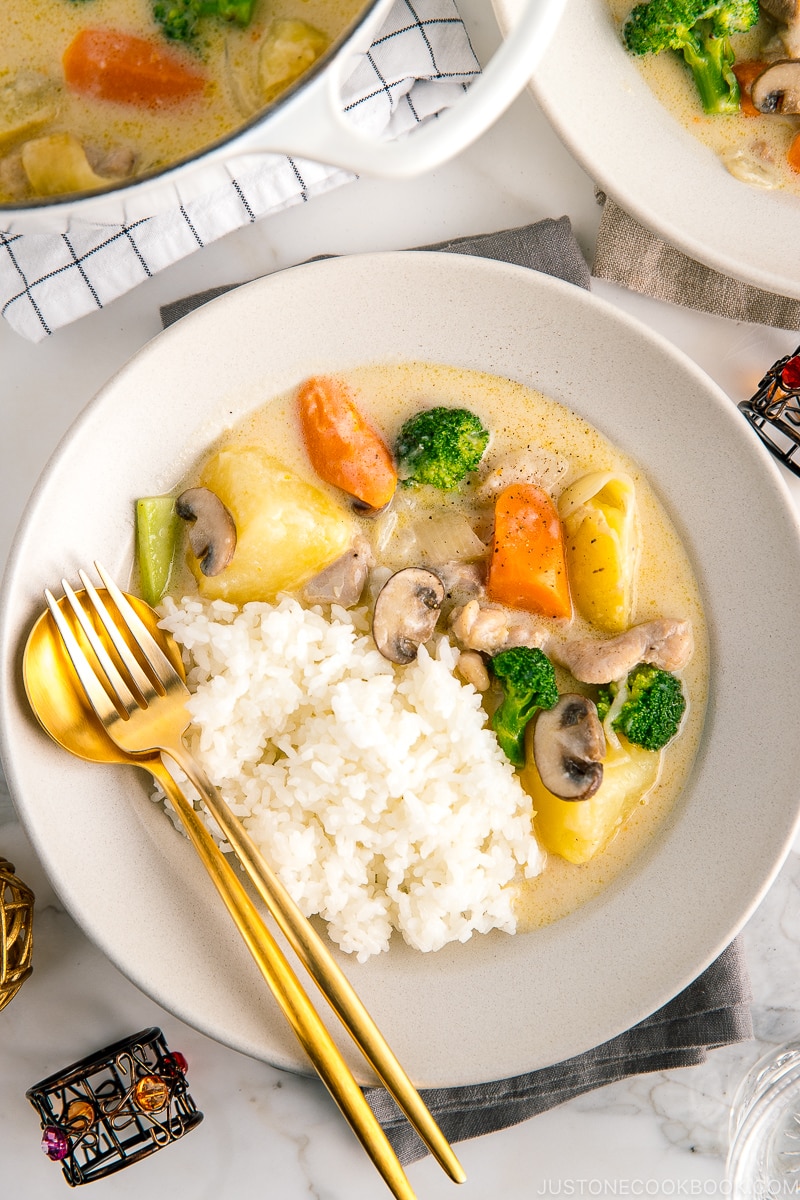
Japanese Cream Stew (クリームシチュー) is one of those meals that manages to hit the spot every time, especially on a chilly, winter evening. You may also see this dish referred to as White Stew (ホワイトシチュー), and it’s easy to guess why. Bite-size pieces of tender chicken, mushrooms, and colorful vegetables simmer together in a creamy white sauce before being ladled over steamed rice. It’s one of my favorite foods to make this time of year.
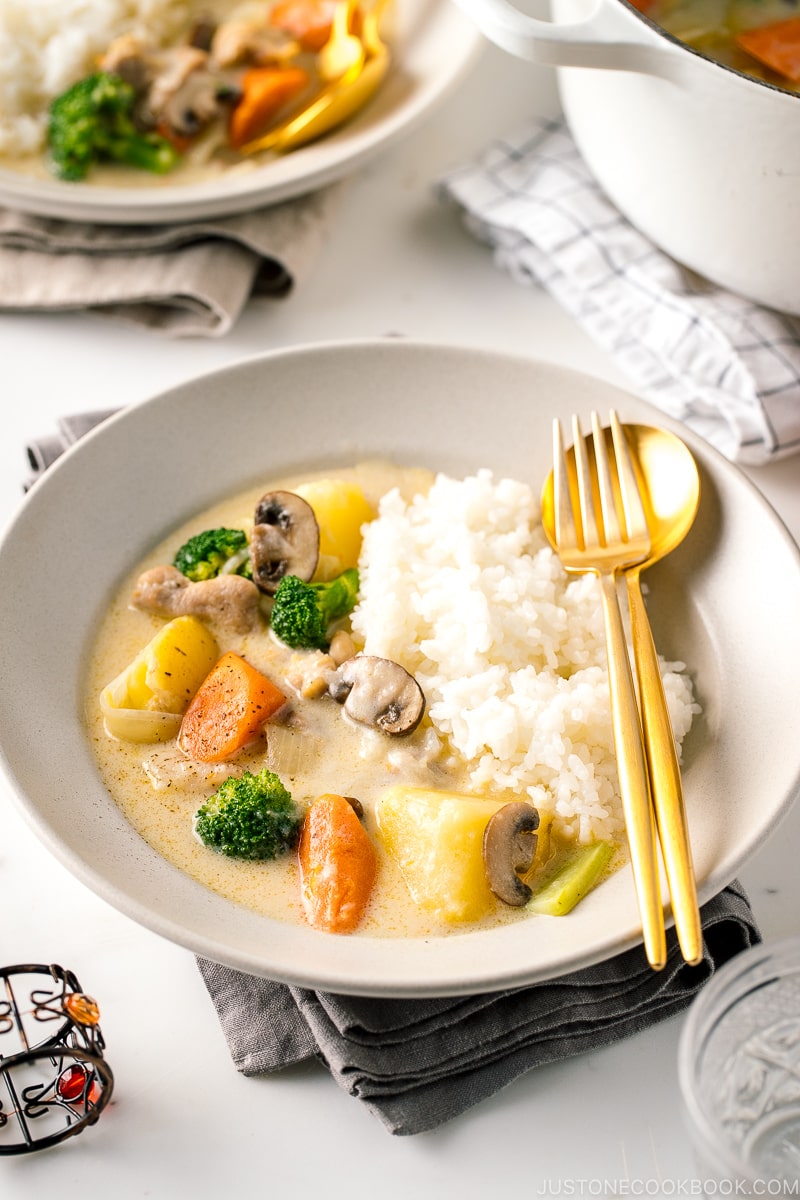
What Is Japanese Cream Stew (White Stew)?
Japanese Cream Stew is a simple meal to make, though the rich, savory flavors feel anything but. If you’ve ever had Japanese curry, this Cream Stew is not so different in terms of preparation and plating.
- Flavor: The layers of flavor in this dish come from sautéed chicken, onions, carrots, potatoes, and mushrooms. For rich, savory thickness, we add béchamel, which is essential for this recipe.
- Ease: After you chop the chicken and vegetables into bite-size pieces, all you have to do is throw everything into one pot and let it simmer. It doesn’t get much easier than that!
- Simmering: Once the meat and vegetables come to a boil, let it simmer for about 10 minutes before adding in your béchamel. Don’t overcook—we want the vegetables to hold their shape!
- Time: From start to finish, this meal takes no more than an hour.
Since its emergence in Japan in 1947 (more on this below), Cream Stew has become a classic Yoshoku dish. This means it’s “a Japanese adaptation of a Western dish.” Just like boxed curry, you can find Cream Stew Mix at Japanese grocery stores. But I guarantee you’ll never reach for the box again once you realize how rewarding and delicious it tastes when made from scratch!
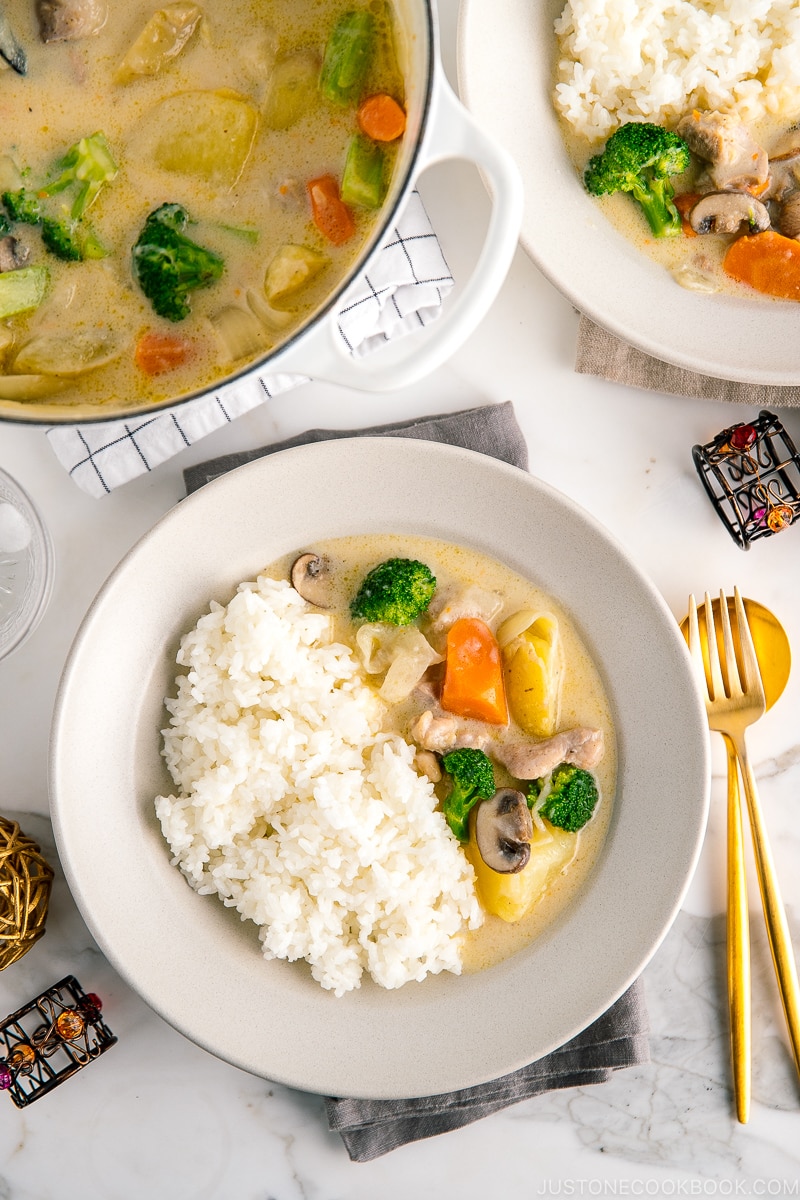
When Was Cream Stew Created?
While simmered dishes (Nimono 煮物), have been a part of Japanese cuisine for a long time (e.g., Kakuni, Oden, Satoimo no Nimono), it wasn’t until Japan’s Meiji Era (1868-1912) that simmered dishes began featuring poultry and other types of meat. (Until then, it was more common to have fish and vegetables in your Nimono.) The Cream Stew I’m going to show you how to make today did not exist in Japan until after 1945.
Powdered milk, supplied by the U.S. government, was thought to be a calcium-rich remedy for children’s malnutrition after the war. The Japanese thickened this powdered milk with flour to make a white-colored stew with chicken and vegetables. It soon became a popular part of Japan’s school lunches.
Almost twenty years after Cream Stew (or White Stew) made its debut in Japan in 1947, home cooks could access it, too, thanks to one of Japan’s largest food manufacturers: House Foods. Similar to the boxed curry cubes you’d find in Japanese grocery stores, House Foods was the first to make Cream Stew Mix in boxes for quick, comforting meals at home.
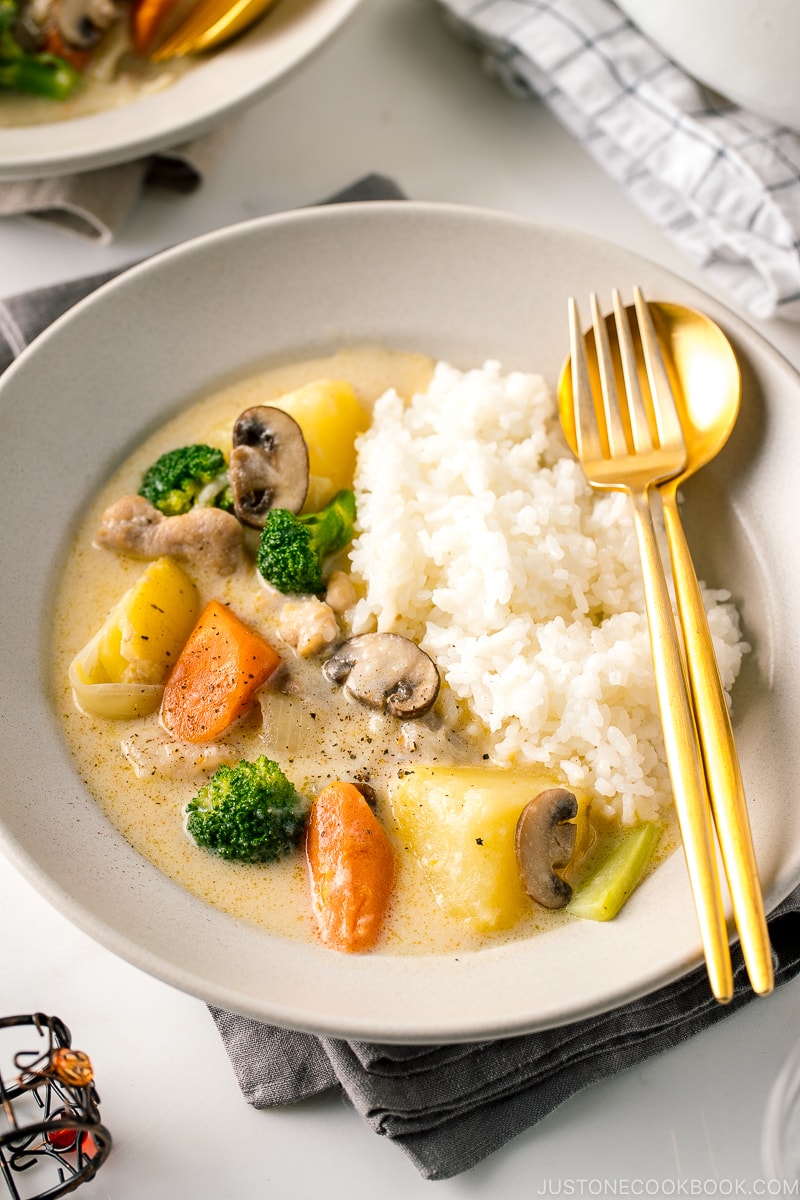
What You Need To Make Cream Stew
Béchamel Sauce
The silky texture and light color of Japanese Cream Stew are the results of a béchamel, which is a base made from flour, butter, and milk. Béchamel sauce is considered one of the building blocks of classic French cuisine. It not only thickens your sauce, it adds richness without making the dish heavy.
Dutch Oven/Large Pot
This meal comes together in one pot, making it the perfect dish for busy weeknights. Unlike other stews or braising recipes, there is no long simmering time required here. All you need is a Dutch oven (or any large pot) so that there’s plenty of room to sauté your meat and vegetables before adding broth.
Chicken or Vegetable Broth
With broth as the base liquid for this stew, you get the added bonus of flavor and nourishment. If you prefer using vegetable broth over chicken broth (or if that’s what you have on hand), it will work fine. Both options will be complementary to the meat and vegetables.
Meat and Vegetables
Prepping these ingredients in advance makes cooking this stew even easier. I like to have all my vegetables chopped and set aside so that once the chicken is almost fully cooked (80%), I just throw them in the pot.
This dish is fairly versatile when it comes to vegetables, but if you’re willing to try it, I highly recommend sticking to the ones I list in the recipe for that authentic, Japanese Cream Stew taste!
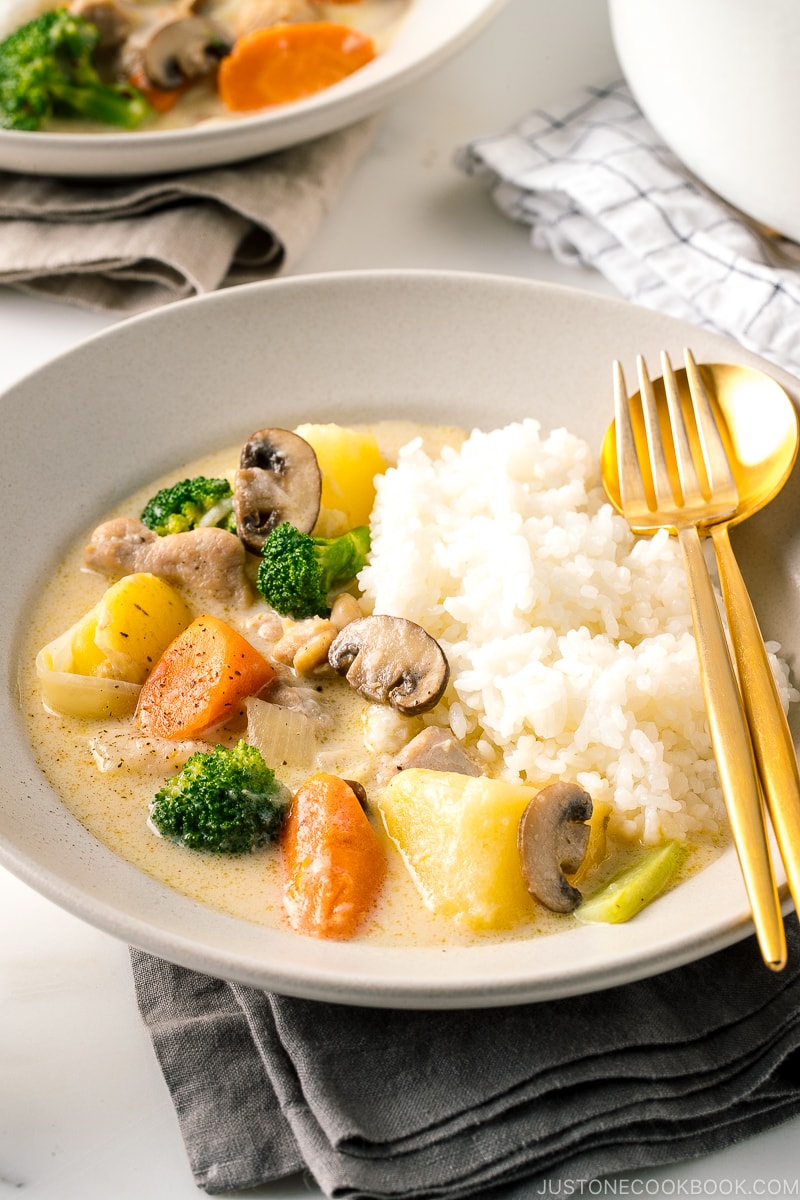
Shortcut: Storebought Cream Stew Mix (Roux)
In Japan, you can find Cream Stew Mix that looks like this.
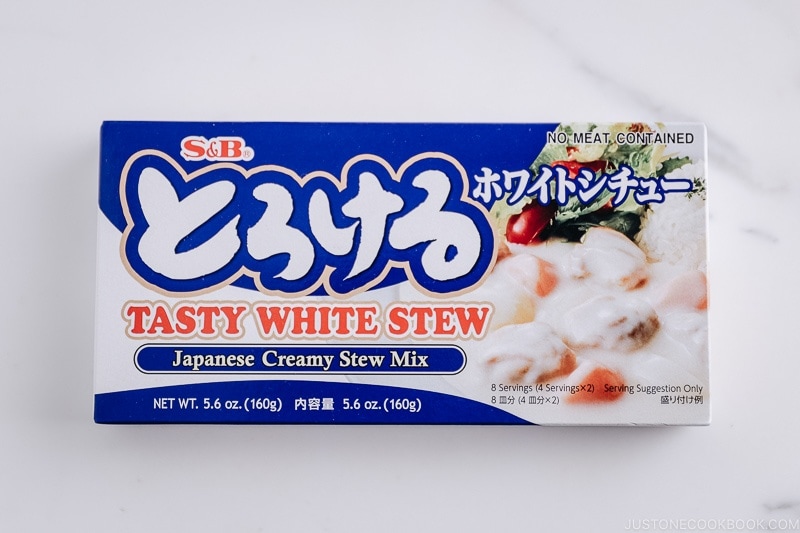
All you need to do is to add the cubed roux into the broth. All the kids learn how to cook Japanese Curry and Cream Stew this way. Even though it’s not made with 100% “natural” ingredients, I’m not against using this. I personally think it’s a great way to learn how to cook a home-cooked dish with the help of the pre-mixed roux, and in my opinion, it’s better than buying fast food.
But, if you are up for it, making your own Bechamel sauce from scratch is always the best. My recipe below will show you exactly how.
How To Serve Cream Stew
Once your stew has finished simmering, let it cool till room temperature to really let the flavors meld and the sauce thicken. Serve it in a wide bowl with freshly steamed rice and enjoy! This stew is also delicious with crusty bread—guaranteed to warm you right up.
If you want to freeze any leftovers, remove the potatoes (the texture changes once frozen) before you pack away your Cream Stew to save for another night.
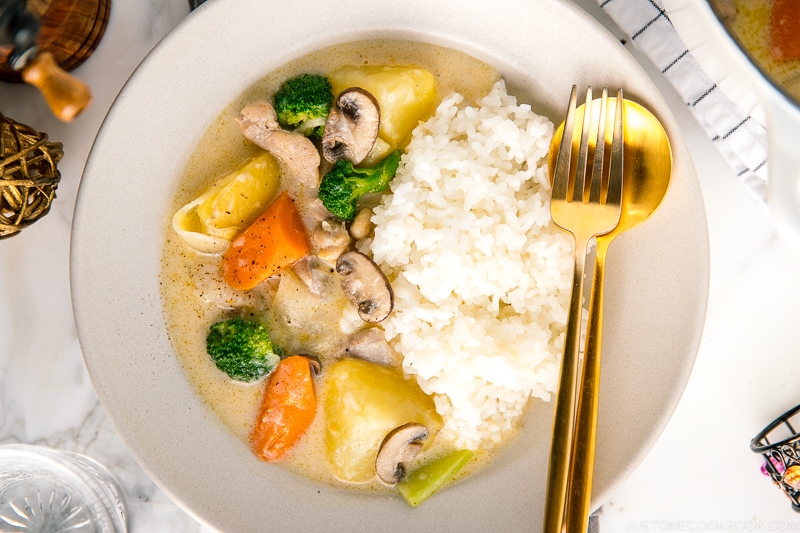
Wish to learn more about Japanese cooking? Sign up for our free newsletter to receive cooking tips & recipe updates! And stay in touch with me on Facebook, Pinterest, YouTube, and Instagram.
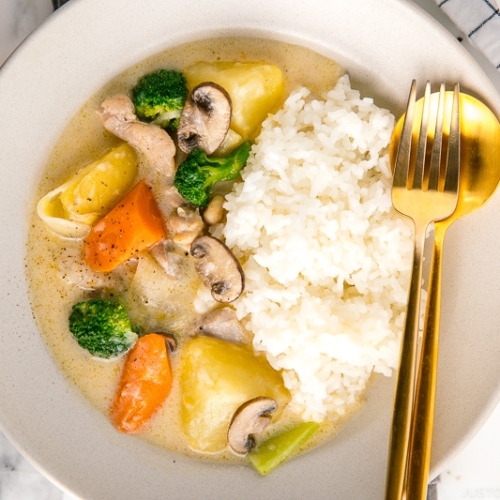
Japanese Cream Stew (White Stew)
Ingredients
- 1 lb boneless, skinless chicken thighs (2–4 pieces; the size can vary, so go by weight)
- ½ tsp Diamond Crystal kosher salt (for the chicken)
- freshly ground black pepper
- 1 head broccoli (4 oz, 120 g)
- 1 tsp Diamond Crystal kosher salt (for the broccoli)
- 1 onion (11 oz, 312 g)
- 2 carrots (9 oz, 255 g)
- 2 Yukon gold potatoes (16 oz, 453 g; Yukon gold potatoes hold their shape better than russet potatoes)
- 6 cremini mushrooms (3 oz, 85 g)
- 1 Tbsp unsalted butter
- 1 Tbsp extra virgin olive oil
- 2 cups chicken or vegetable stock
- 2 bay leaves
For the Homemade White Sauce (Béchamel Sauce)
- 3 Tbsp unsalted butter
- 1 cup whole milk
- 3 Tbsp all-purpose flour (plain flour)
- 1 tsp Diamond Crystal kosher salt
- ⅛ tsp white pepper powder
- ⅛ tsp ground nutmeg
For the Instant Cream Stew Mix (optional)
- 1 box Japanese Cream Stew Mix (optional; skip if you make the homemade white sauce above)
For Finishing the Stew
- 2 Tbsp heavy (whipping) cream (optional)
- 1 tsp Diamond Crystal kosher salt (to taste)
Instructions
- Gather all the ingredients.

To Prepare the Chicken
- Cut 1 lb boneless, skinless chicken thighs into 1½-inch pieces of even thickness. To do this, tilt your knife back and slice at a diagonal angle. The slanted surface gives each piece a flatter and more open area so the chicken cooks evenly and faster. This cutting technique is called sogigiri in Japanese.

- Season the chicken with ½ tsp Diamond Crystal kosher salt and freshly ground black pepper.

To Blanch the Broccoli
- Cut 1 head broccoli into florets and stem pieces: First, trim the head into florets. Then, remove the stem‘s tough outer skin and cut it into bite-size pieces.

- Boil a pot of water and add 1 tsp Diamond Crystal kosher salt for blanching the broccoli. Add the stem pieces first and cook for 1½ to 2 minutes.

- Then, add the florets and cook for an additional 2 minutes, or until almost tender and still crisp. Remove from the water and let cool. You can shock the blanched broccoli in ice water to make it as bright green as possible, but since I add them to the stew anyway, I usually skip that extra step. Tip: Don’t overcook the broccoli now as they will cook a bit more when we reheat them in the stew.

To Prepare the Other Ingredients
- Cut 1 onion in half lengthwise and then into wedges. Trim off any root ends that are connecting the onion layers together so that they separate easily. Tip: Separate each layer at this step, so you don‘t have to do it in the pot later.

- Peel and cut 2 carrots at an angle into 1½-inch pieces, rotating the carrots a quarter turn between cuts. This cutting technique is called rangiri in Japanese.

- Cut 2 Yukon gold potatoes into 1½-inch chunks. For these potatoes, I did not remove the skin.

- Trim off the stems from 6 cremini mushrooms and slice the caps thinly.

To Cook the Ingredients
- In a large pot (I used a 4½-QT pot), heat 1 Tbsp unsalted butter and 1 Tbsp extra virgin olive oil over medium heat. If you‘re using a nonstick pot, you can omit the olive oil.

- Add the chicken and sauté until 80% cooked through.

- Add the onion and stir to cook until the chicken is no longer pink.

- Add the potatoes and carrots and coat well with the oil in the pot.

- Then, add 2 cups chicken or vegetable stock and 2 bay leaves.

- Bring it to a boil on medium heat. Tip: The broth won‘t fully cover the ingredients at this time. The vegetables soon will release moisture and increase the cooking liquid to eventually submerge the ingredients.

- Once boiling, reduce the heat to simmer. Skim off the scum and foam on the surface.

- Add the mushrooms and simmer on gentle heat, covered, for 10 minutes. Tip: Set a timer, as the potatoes can easily overcook.

To Make the Homemade White Sauce (Béchamel Sauce)
- While the stew is simmering for 10 minutes, make the homemade white sauce, also called a béchamel sauce. (If using a store-bought cream stew mix, skip ahead to the next section). In a small saucepan, heat 3 Tbsp unsalted butter and let it melt completely on medium-low heat. During this time, heat up 1 cup whole milk in the microwave or on the stovetop until it‘s warm to the touch.

- Turn down the heat to medium low and sprinkle 3 Tbsp all-purpose flour (plain flour) onto the melted butter. Use a blunt-end spatula or whisk to stir it constantly and vigorously, without stopping.

- The butter-flour mixture will swell and bubble. Continue to cook for the next 5 minutes, stirring and scraping the bottom of the pot constantly. It‘s important to cook the flour gently during this step to get rid of its raw taste, but don‘t let it toast or turn dark. You want the pale color of a white roux. If it starts to brown, turn off the heat temporarily or reduce the heat to low while you finish cooking it. Once it‘s done cooking, set the heat to medium low.

- Next, slowly and gradually add 1–2 Tbsp of the warm milk to the saucepan. Use your spatula or whisk to quickly and vigorously blend the milk into the butter-flour mixture. You will notice the mixture absorb all the moisture and clump up.

- Continue to add more milk, 1–2 Tbsp at a time, stirring quickly after each addition to combine it well with the flour mixture and smooth out any clumps. Don’t hurry, and NEVER add too much liquid at once or you might create lumps. Once you get lumps, they are hard to fix.

- The goal is to blend the mixture COMPLETELY each time before you add more liquid. Make sure there are no lumps of flour left when you‘re done adding all the milk.

- Once you incorporate all the milk, add 1 tsp Diamond Crystal kosher salt, ⅛ tsp white pepper powder, and ⅛ tsp ground nutmeg and mix it all together. Your white sauce is now done. Turn off the heat and set it aside.

To Combine the White Sauce and Cooking Broth
- After 10 minutes of simmering, open the lid to the stew pot.

- Check for doneness by inserting a skewer into a potato. It should be tender, but don‘t overcook it. It should not break easily. Next, combine the white sauce and cooking broth. If using 1 box Japanese Cream Stew Mix (optional), add 2 cubes of the mix into a ladleful of hot cooking liquid. Slowly dissolve it with a spoon or chopsticks, then stir it into the stew pot to incorporate. Repeat with the rest of the blocks, 2 cubes at a time.

- If you made the homemade white sauce, scoop a ladleful of hot cooking broth and gradually add it into the pot of white sauce as you stir to blend it completely.

- Add another ladleful of broth and combine well. Now, pour the diluted white sauce back into the stew pot. Gently mix to blend it completely with the rest of the cooking liquid.

- Once you‘ve added the homemade white sauce or store-bought mix, add 2 Tbsp heavy (whipping) cream (optional). Season with up to 1 tsp Diamond Crystal kosher salt, to taste.

- Simmer, uncovered, for another 5–10 minutes on low heat. Tip: To improve the flavor, I highly encourage you to let the stew sit on the stove or countertop at this point and cool to room temperature (keep the lid open). The stew will naturally thicken as the moisture evaporates and the flavors will meld as the stew cools. Then, reheat before serving.

To Serve
- Right before serving, add the blanched broccoli to the stew to reheat. Simmer on low heat and do not boil. Once everything is nice and warm, serve the stew in individual bowls. Enjoy it with steamed rice in the bowl or crusty bread on the side.

To Store
- You can store the leftovers in an airtight container and keep it in the refrigerator for up to 2 days. If you plan to freeze it, remove the potatoes (their texture will change) and freeze for up to a month.
Nutrition
Editor’s Note: The original post was published on February 16, 2011. The post has been republished in December 2020 with a new recipe, new images, and updated content.
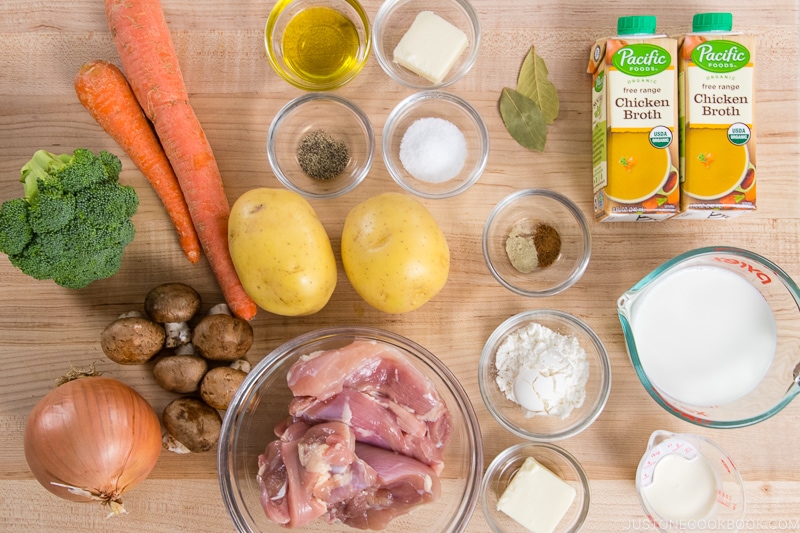


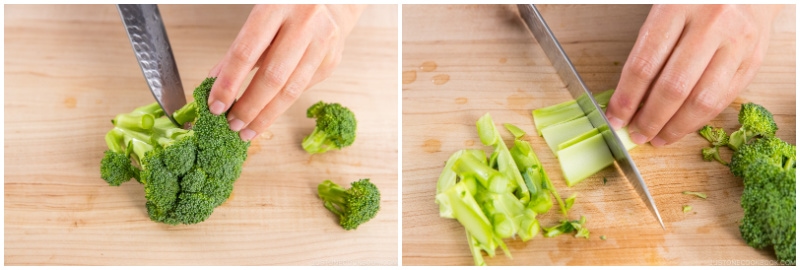
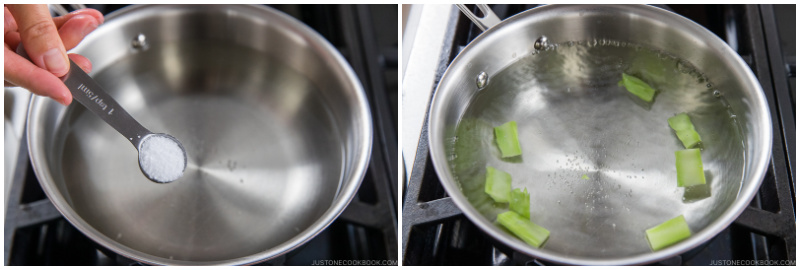
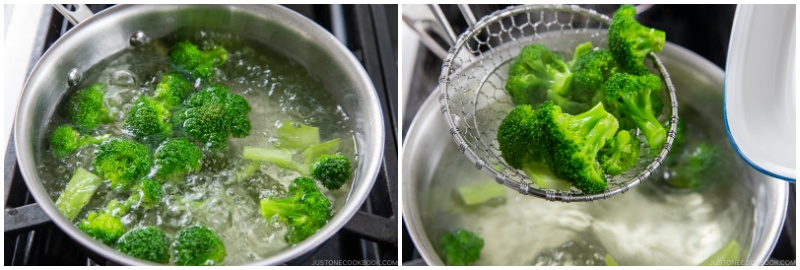
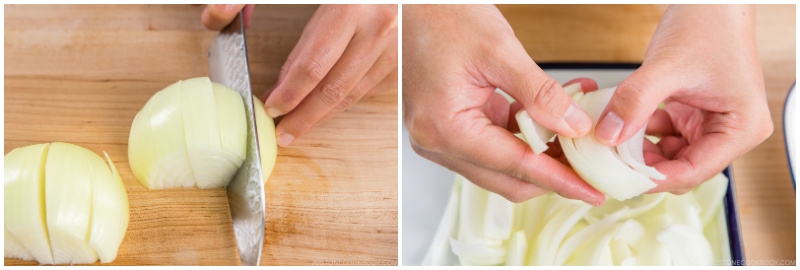
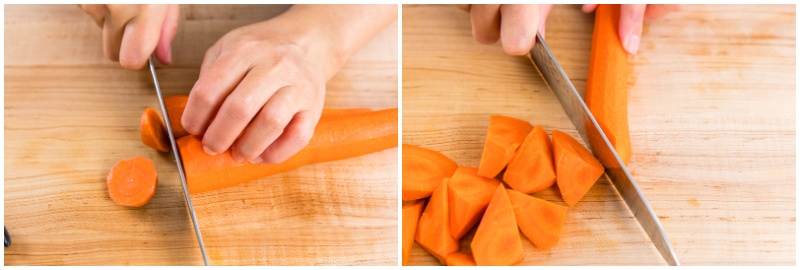
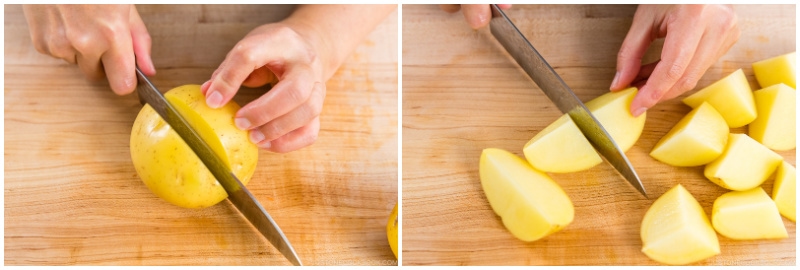
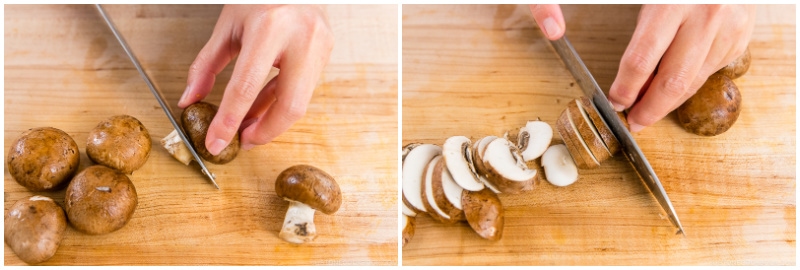
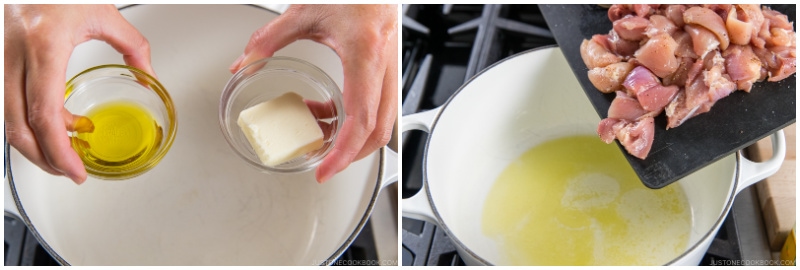
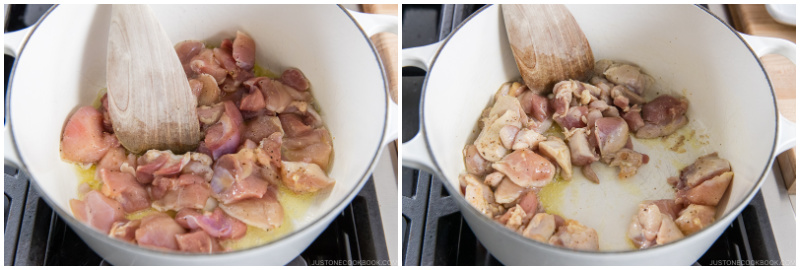
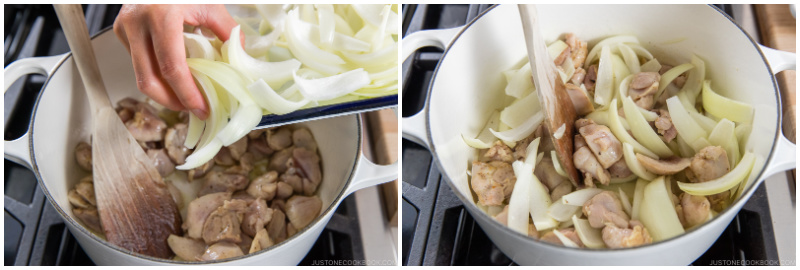
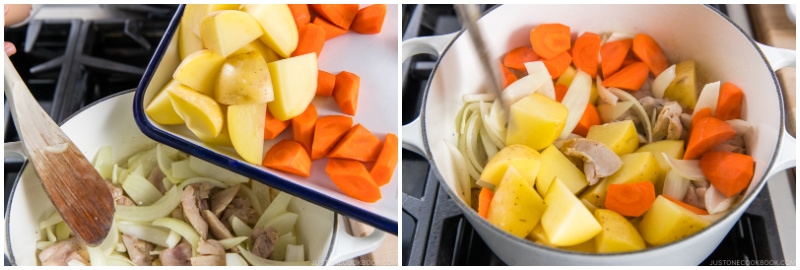
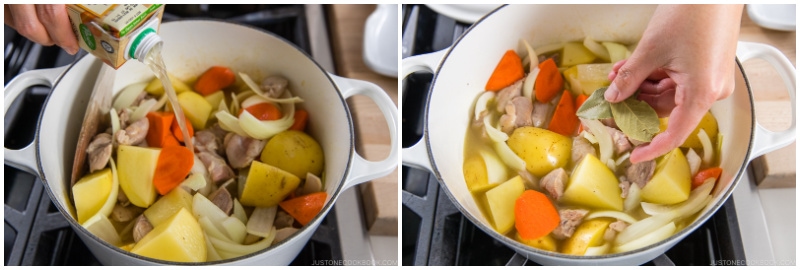
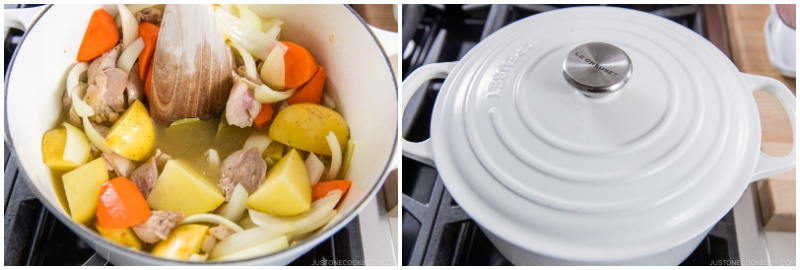
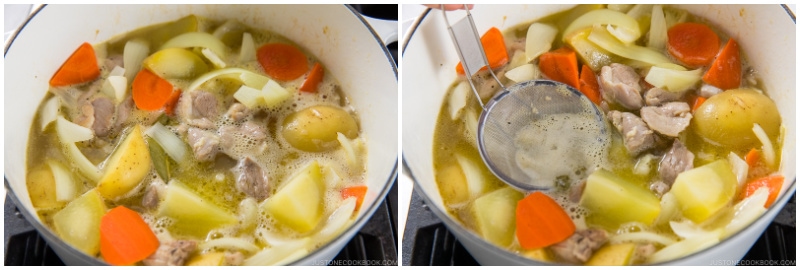
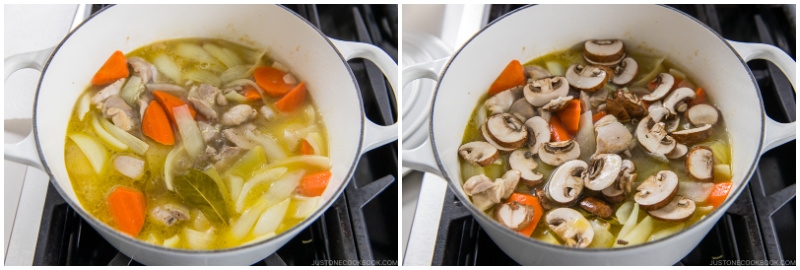
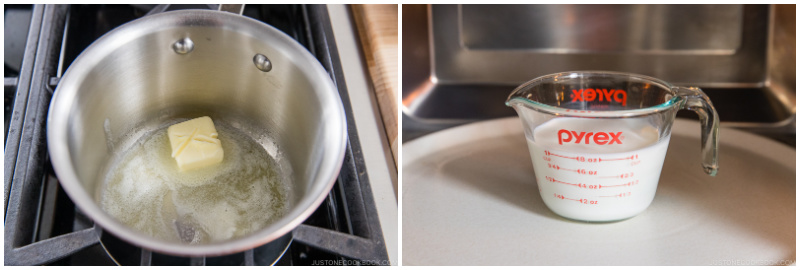
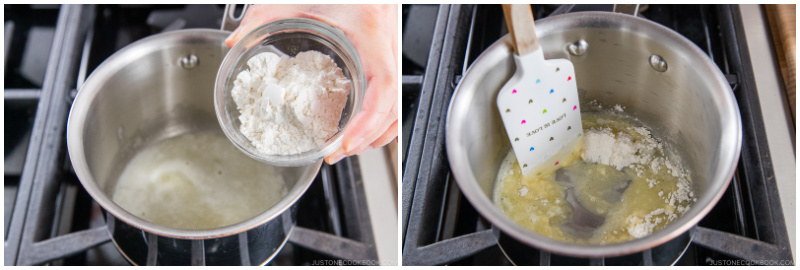
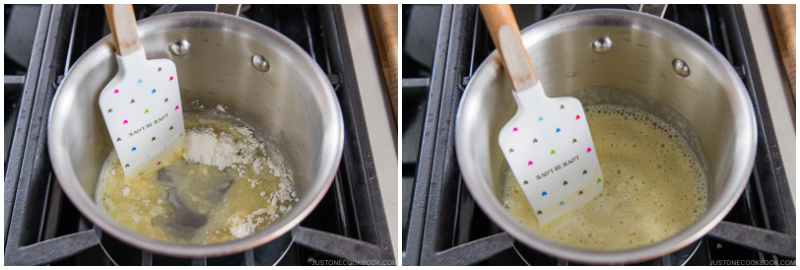
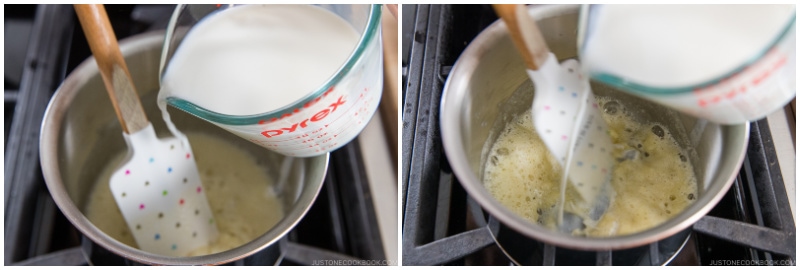
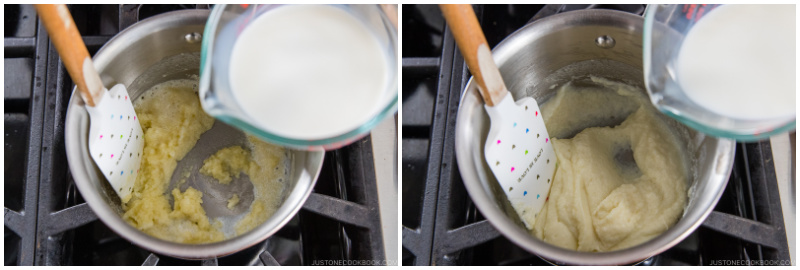
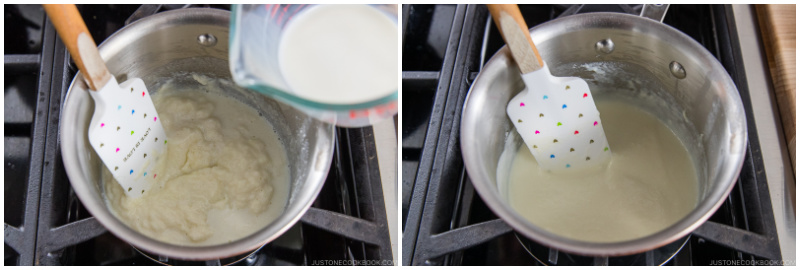
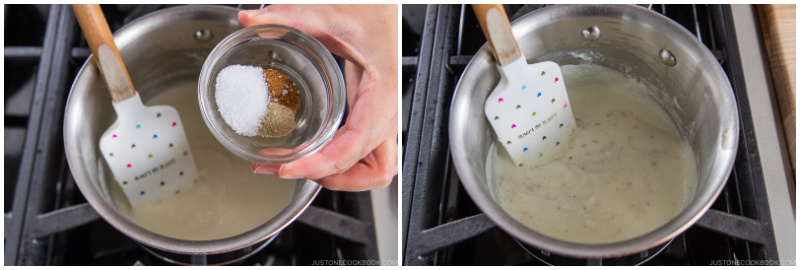
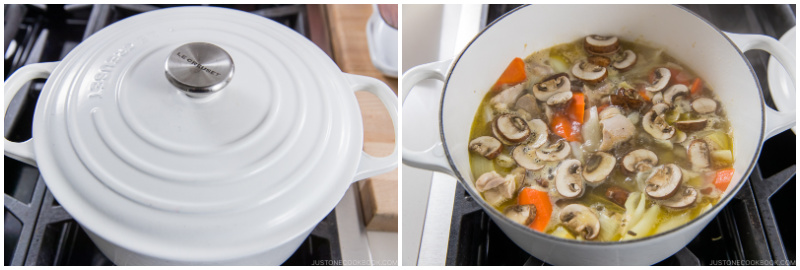
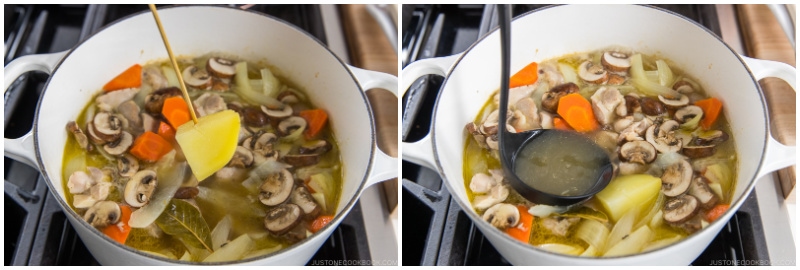
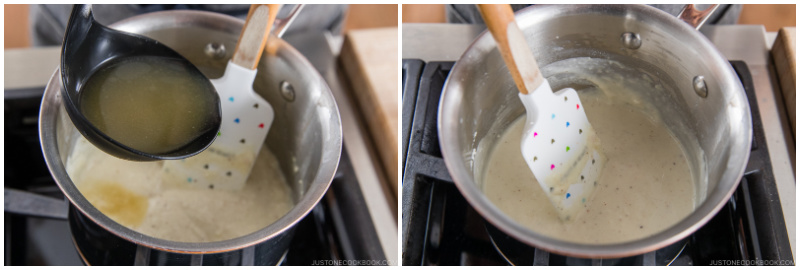
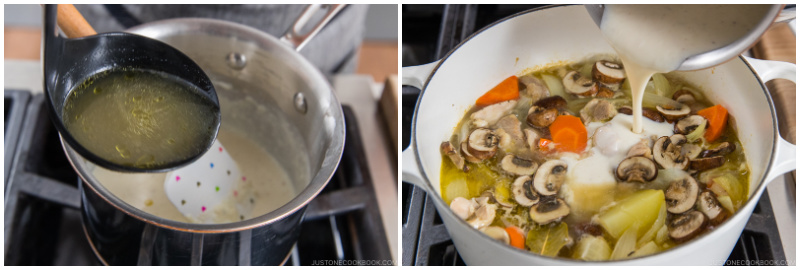
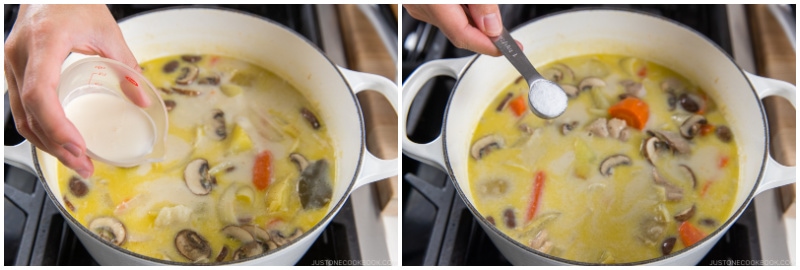
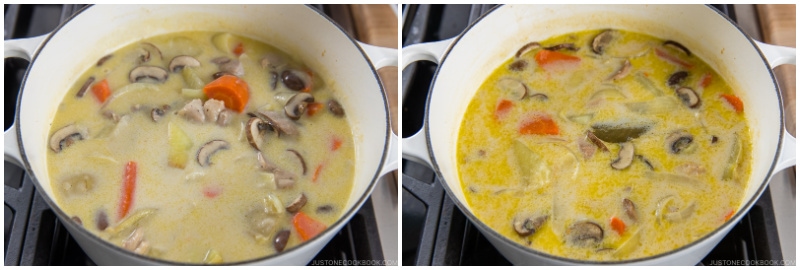
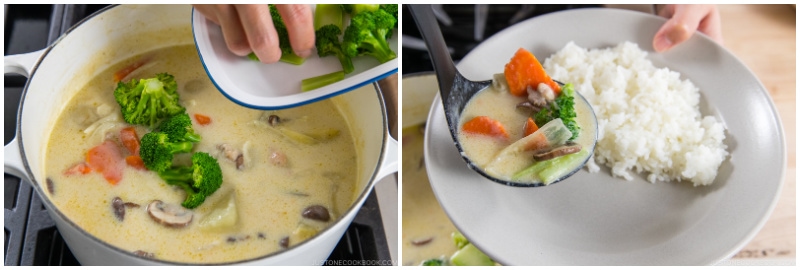

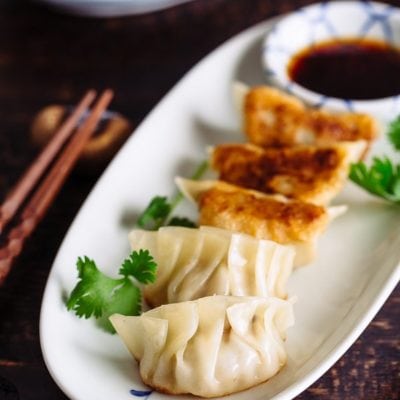
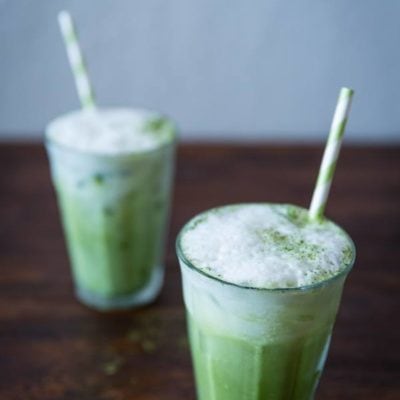

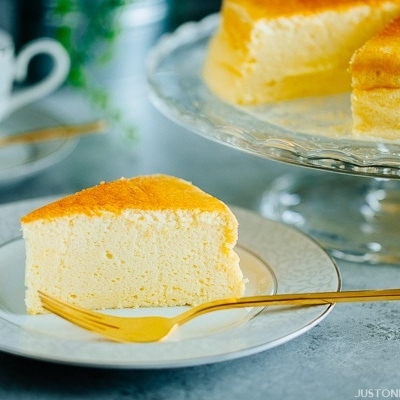
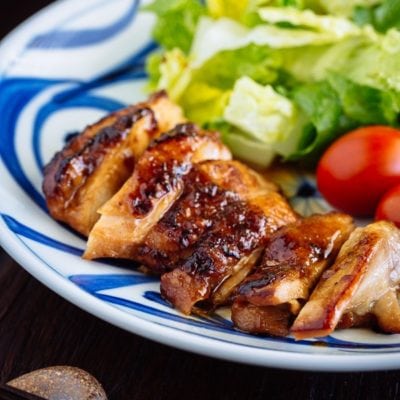
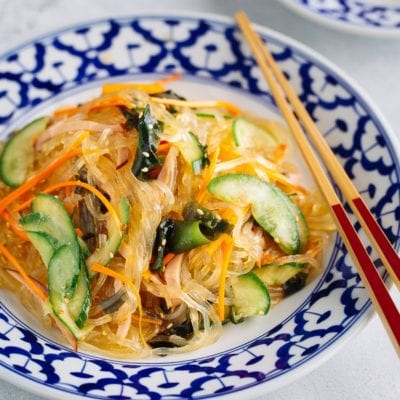
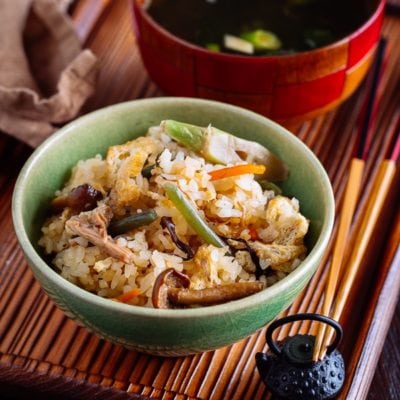
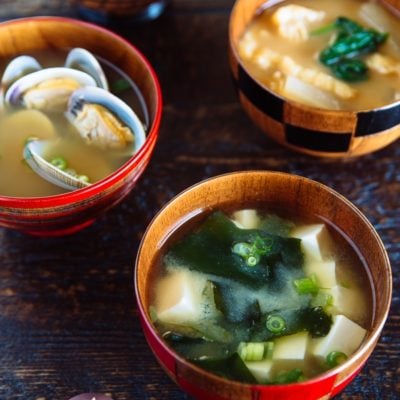

I grew up loving my Japanese mom’s cooking and I’m so grateful for your recipes which are definitely authentic and hit home! I have to veganize them though which is a fun challenge and usually very easy. I’d LOVE to see your ideas on how to make every recipe vegan. For this one, I used a marinated tofu recipe instead instead of chicken, oat milk instead of cow milk and cream, plant-based butter, veg stock, and added corn, peas, brocollini, carrots, potatoes, mushrooms, and onions. It was purrrfect 😽
Hi Allyson! Awesome!😍 Thank you very much for your kind feedback and for sharing vegan versions! It sounds delicious! 😋
I used the premade roux blocks from the store with this recipe and it was so so good. It was my first time making this recipe and definitely not the last. Thank you!
Hi Ellie! We are so happy to hear it turned out well with roux blocks!
Thank you very much for trying Nami’s recipe and sharing your cooking experience with us.😊
I’ve made this recipe three times now…am actually making it tonight. This one is a keeper!
Hi Marie! Aww. We are so happy to hear you enjoyed this recipe!
Thank you very much for trying Nami’s recipe and for your kind feedback!
I made this yesterday. Perfect for cold autumn day. So delicious. I loved that it was creamy without being heavy. The only change I made was the chicken. My daughter and I do not care for dark meat, so I used boneless skinless chicken breast and it was perfectly tender. Will definitely make again.
Hi Jannette! Thank you very much for your kind feedback and for sharing your experience with us!
We are glad to hear it worked out well, and you and your family enjoyed the stew!☺️
You formally had this recipe with tuna in it, I wish you had both recipes posted! The old one was just perfectly balanced and while this one is AWESOME I really want the old one again.
Hi Brooke, Thank you very much for trying Nami’s recipes! Nami has updated the recipe with more clear instructions. She also thought it’s best to teach the classic technique to make the white sauce properly. You can always add canned tuna to this recipe if you prefer. But it was something she learned from her friend and not a “classic” cream stew. We hope this works for you. 🙂
Hello Nami, I’ve made this recipe once and it was so delicious! Thank you!
Now, I want to add cheese to make it more thick and creamy. Do you think it’s a good addition or it will ruin the taste?
Hi Destri! Thank you very much for trying Nami’s recipe and for your kind feedback!
It depends on the type of cheese, and if you use mild taste cheese, it will not ruin the taste. However, the cheese will make the Stew saltier, so please adjust the salt amount.
Another idea to make this Stew creamy is to replace some milk amount with heavy whipping cream.
We hope this is helpful.
This was absolutely delicious ! I made it exactly as shown and it was greedily eaten by whole family. (I added some dry white wine and it seemed to enhance the already deep “umami” flavor). Thanks so much for sharing these authentic Japanese recipes in such a clear, understandable format. Also appreciate the fact that we can convert recipe measurements straight to metric!
Hi Miriam, Thank you very much for trying this recipe and for your kind feedback!
We are so glad to hear you and your family enjoyed the dish, and great to know that the convert feature was helping!
Hello Nami! I have been following your blog for a couple of years (I believe I first discovered it looking for a Mochi recipe!) and your recipes are the best!
I tried this tonight with my family and it was a huge hit! My husband who won’t even look at dark meat LOVED it! We plan on doing a Nami Meal week next week using only your recipes! I think we may do Omurice tomorrow (my kids love eggs and rice!)
Thank you for your amazing recipes!
Hi Britt! Aww… Nami Meal week! It sounds like a great plan!!! Thank you very much for your long-time support and for trying many recipes include this cream stew! Nami and the team are so happy to hear you and your family enjoyed many recipes!❤️ Happy Cooking!
I am a 17 year old American that has been cooking from scratch for about 5 years. I have never made any kind of stew successfully before this. I made this stew for my family and they all said it “was the best stew I’ve ever had”. It was super easy to make and amazingly delicious. 10 out of 10 would make this again. (My sister asked me to make this for her every week.) Thank you for a delicious recipe!
Hi Kaitlyn, Awesome! Thank you very much for trying this recipe and for your kind feedback! We are so happy to hear you and your family enjoyed Japanese Cream Stew.
Thank you for your many recipes. I made your recipe but followed the boxed roux version in comments and substituted french beans for broccoli (none available that day). It was super yummy. I love your Instagram and Facebook posts too!
Hi Louise, Thank you very much for trying Japanese Cream Stew! We are so happy to hear you enjoy many of Nami’s recipes, Instagram, and Facebook posts! Thank you for your love and support.💕
I would give this recipe more than 5 stars if that was an option!
Two thumbs up.
10 out of 10.
A definite keeper.
I made this on a weeknight, and it was quick to get on the table, and then we sat around eating it, mmmm-ing the entire time. You’ve hit this one out of the park, Nami!
Hi Tammy,
Yay! We are so happy to hear you enjoyed this Cream Stew!
Thank you very much for trying Nami’s recipe and for your sweet comment!
This looks wonderful and I can’t wait to try it. Your recipes are excellent and I’m sure this will not be any different!
However, I’d like to make it with something other than chicken. Would seafood work in this? What would you suggest to substitute? Thank you so much!
Hi J,
Thank you very much for your kind feedback!
Seafood cream stew is delicious too! However, Seafood cooks faster than Chicken, so recommend adding Seafood when you combine White Sauce and Broth after cooking vegetables.
We hope this helps!
Hi Nami! I am a long-time reader, and a huge fan of your recipes! I’ve got to say, this is now my favorite comfort meal, ever. I live in Florida, but it’s gotten a bit cold this past week so I’ve been craving something warm. This was my first time making white stew but have wanted to try for quite some time….and just..WOW! It came out amazing! I had to stop myself from making another bowl. This recipe will become a go-to. Thank you!
Hi Summer!
Aww… Thank you very much for your kind feedback!
Nami is happy to hear you enjoyed this Cream stew, and it’s now your go-to meal!
Please stay safe and Have a wonderful New Year!
What a very interesting stew. I’ve never heard of a stew with a bechamel as the base. This is one for the winter soup list this year. Thanks Nami! I hope you and your family have an absolutely wonderful Holiday Season!!!
Hi mjskitchen,
We hope you enjoy this White Stew this winter!
Have a wonderful Holiday Season!😊
Hi Nami! I was wondering if you revised this recipe recently? I think previously your white stew recipe involved adding flour and whipping cream directly to the pan with other ingredients (e.g. chicken, carrots, potatoes), rather than making the white sauce separately? Actually I prefer making the white sauce separately as shown here/ now, since I worry about burning the flour in the pan with other ingredients.
On a separate note, my family and I have been enjoying your many recipes for the past 9 months! Your instructions are detailed and clear, and the flavours really suit our palate and age range (preteen to elderly).
Please keep up this inspiring work and labour of love! Happy Holidays!
Hi Juliana! Thanks for your kind comment. In fact, I did and made it a more classic way, and will plan to republish later this week. So happy to hear your family enjoy my recipes and thank you for making many of my recipes! 🙂